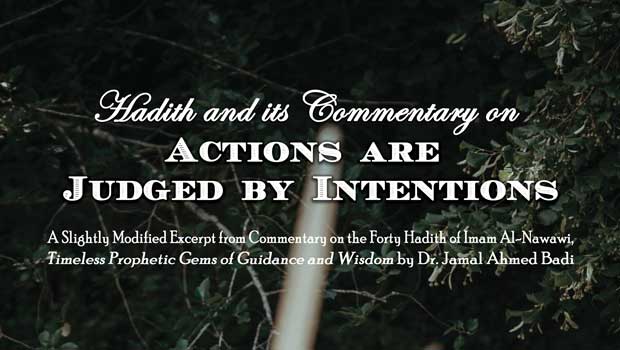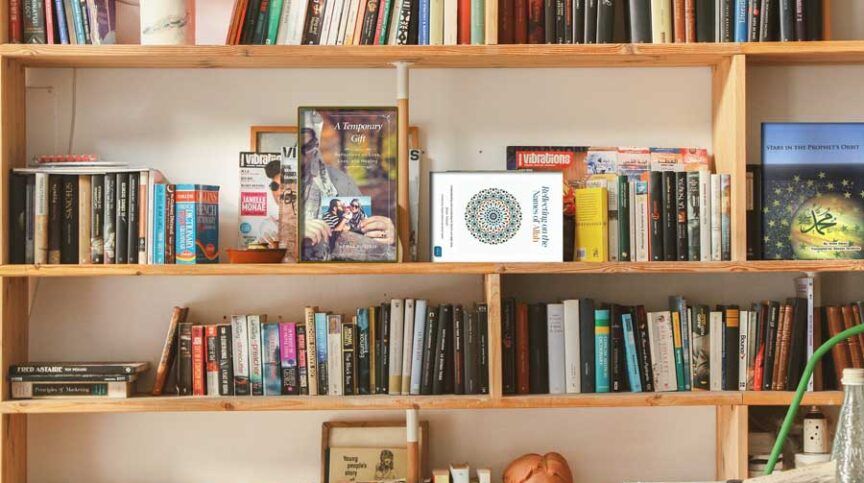An Excerpt from Commentary on the Forty Hadith of Imam Al-Nawawi
Timeless Prophetic Gems of Guidance and Wisdom
–
It is narrated on the authority of Amīr al-Muʹminīn, Abū Ḥafṣ ʼUmar bin al-Khaṭṭāb (R), who said: “I heard the Messenger of Allah say:
“Actions are judged by niyyāt (intentions), so each man will have what he intended. Thus, he whose Hijrah (migration) is for Allah and His Messenger, his migration is for Allah and His Messenger; but he whose migration is for some worldly thing he might gain, or for a wife he may marry, his migration is for that which he migrated” (Al-Bukhārī and Muslim).
Introduction
This ḥadīth is considered to be one of the greatest ḥadīth in Islām. According to Al-Imām al-Shāfiʼī;, this ḥadīth is one third of the knowledge of Islām being related to over seventy topics of fiqh. This ḥadīth was expressed by the Prophet (pbuh) at the time when a man migrated from Makkah to Madīnah during the Hijrah for the sake of marrying a woman.
Niyyah or intention has two meanings:
1. The intention before performing an ʼibādah (an act of worship such as prayer, fasting, etc.)
2. The willingness of performing an action
In this ḥadīth, the Prophet (pbuh) starts with the principle “Actions are judged by intentions,” and then gives three practical examples. This is a methodology used by the Prophet (pbuh) when conveying certain Islāmic principles. Examples help illustrate the principle so that it is easier for people to understand it, and so that they can apply it to other situations. The three examples consist of: (1) a single good intention (migration for the sake of Allah and His Messenger) and (2) two inferior intentions (migration for the sake of worldly gains or marriage).
Lessons
A. Ikhlāṣ – Sincerity to Allah (SWT)
This ḥadīth emphasizes the importance of ikhlāṣ, or sincerity. This is to be truthful and honest with Allah (SWT), performing an act solely for His sake whereby no other entity or thing is sought. Ikhlāṣ is the major condition for the acceptance of good deeds. This ḥadīth is therefore a criterion to help Muslims evaluate and judge what they do and say “as an ʼibādah” in their daily lives. The other condition is that actions must be done in accordance with the Sharīʼah (Islāmic Law) as is explained in Ḥadīth 5 [“Whosoever introduces into this affair of ours (Islām) something that does not belong to it is to be rejected” (Al-Bukhārī & Muslim)].
Ikhlās, or sincerity is to be truthful and honest with Allah (SWT), performing an act solely for His sake whereby no other entity or thing is sought. Ikhlās is the major condition for the acceptance of good deeds
The interdependence of these two conditions is illustrated in the Shahādah (declaration of faith). Its first statement “I bear witness that there is no god but Allah” is ikhlāṣ ensuring that our actions are for the sake of Allah (SWT) alone. The second part of the Shahādah, “I bear witness that Muḥammad is the Messenger of Allah,” is the Sunnah. This is the sayings, actions, and affirmations of the Prophet (pbuh) — which in turn is really the manifestation of the Qurʹān itself. The Prophet (pbuh) is our model and the best example to follow. Following his Sunnah in our ʼibādah, akhlāq (ethics), and muʼāmalāt (dealings) ensures that we are acting in accordance with the Sharīʼah. Thus, the Shahādah shows us that the conditions for performing an action and its acceptance are that:
1) it should be for the sake of Allah (SWT) as He is the only One we worship
2) it should be in accordance with the Sharīʼah
B. Developing and Preserving Ikhlāṣ
There are various ways in which we can gain or increase our ikhlāṣ. These are the following:
• Checking the niyyah – Al-Imām Aḥmad said: “Before you do anything, check your niyyah – ask yourself before performing an action, ‘Is this for the sake of Allah (SWT)?’”
• Seeking knowledge – Prior to the doing of any deed, we should seek ʼilm, or knowledge. Our actions and deeds should be based on knowledge to ensure that these are performed in accordance with the Sharīʼah.
• Increase in righteous deeds – The more good deeds that we do, the closer we will get to Allah (SWT) and inshā Allah, the more sincere we will become.
• Avoidance of giving false impressions – we should not make others believe that an action is good when it isn’t.
To achieve ikhlāṣ, we must avoid four major things that directly negate ikhlāṣ. The first thing is to avoid shirk, or associating others with Allah (SWT) at all costs. The second thing which immediately spoils sincerity is hypocrisy, or nifāq. The third negator of ikhlāṣ closely related to hypocrisy is riyā’. This is performing an ʼibādah with the intention of showing off to others. Last but not least is ma’ṣiyah, or committing sins which decreases our sincerity. On the contrary, doing good deeds enhances it.
According to Al-Imām al-Harawi, the root cause for insincerity is hawā’, or desire. Therefore, no deed should be done based on lowly desires. Al-Imām al-Harawī states that there are seven types of desires. These are the following:
• To make oneself appear good in the eyes of others
• To seek the praise of others
• To avoid being blamed by others
• To seek the glorification of others
• To seek the wealth/money of others
• To seek the services or love of others
• To seek the help of others for oneself
Ibn al-Qayyim says that any action we do may be defective for the following three reasons:
1) Being conscious that others are observing the action
2) Seeking a return (worldly benefit/reward) for the action
3) Being satisfied with the action
There are several different ways in which we can be sincere, and thus gain ikhlāṣ. For example, after every ṣalāh, we should be self-critical and tell ourselves that we could have performed it in a better manner. In this way, we not only prevent ourselves from self-praise, but we can improve our next ṣalāh. If we arrive early for the ṣalāh in the masjid before the imām or in the first ṣaff, we should steer away from thinking ourselves as better than others. We should rather, praise Allah (SWT) for enabling us to go to the masjid, and for being able to perform the
ṣalāh without any difficulty.
Although we must always ensure that our actions do not deviate from ikhlāṣ, there are several actions which can be automatically regarded as being done with a good intention. For example, ʼibādah in secret (qiyām al-lail, dhikr, ṣadaqah, fasting), daʼwah (inviting others to Islām), community service, and seeking knowledge in Islām are some of these good actions.
C. Additional Matters Related to Intention
Sometimes, there can be a combination of intentions included in an action. For example, this can happen in the madrassah where the teacher performs an ʼibādah as a means of teaching others. In this case, the ʼibādah is done first for the sake of Allah (SWT), but it also done with the intention of teaching others. This does not diminish from the niyyah of the action. We also see an example of this from the Prophet (pbuh). When he performed the ḥajj, he of course did it for the sake of Allah (SWT) but also as a means to teach his companions the rites of ḥajj.
What if our niyyah changes while we are performing an action? Ibn Rajab says that if the niyyah at the end of the action matches the beginning (i.e. doing an action for the sake of Allah (SWT), then any changes in the middle of performing the action will be forgiven, or it will not matter, inshā Allah. However, if the niyyah at the end does not match the beginning (i.e. we do not perform the action for the sake of Allah (SWT), then tawbah, or sincere repentance must be done.
Another instance which highlights the importance of niyyah in the qualification of an action is in unintentional swearing, which is commonplace in certain Arab countries. In these instances, the swearing by Allah is done simply out of habit – as it may be customary in that culture, an expression which frequently rolls off the tongue. When a person swears by Allah by saying “wallāhi” (by Allah), but their intention is not to actually swear by Allah, then the saying is without value. A Muslim should do his/her best to minimize this.
D. Centrality of Ḥadīth 1
This first ḥadīth is central to Islām in many different ways. Al-Imām Aḥmad; said: Islām is based on the following three principles:
1. Actions of the heart – our internal actions
2. Actions of the limbs — our external actions
3. Interactions between people – our daily dealings or “muʼāmalāt” with people
Here, principle #1 is based on this ḥadīth. Furthermore, this is the one of three major aḥādīth that forms the criteria for evaluating and judging an action of ʼibādah. Al-Imām Aḥmad says “Islām is based upon three aḥādīth,” which are the following:
1. “Actions are judged by intention (actions of the heart)”.
2. “Whosoever introduces into this affair of ours (i.e. Islām) something that does not belong to it, it is to be rejected.”
3. “Truly, what is lawful is clear, and what is unlawful is clear, and in between the two are matters which are doubtful which many people do not know…”
Conclusion
Altogether, this ḥadīth is central to Islām in numerous ways, perhaps being the most important ḥadīth in Islām. The message of this ḥadīth is clear that each action of ours is determined by our intention, whether it is good or bad. Therefore, we should always check our intention. We must ensure that the action is done for the sake of Allah (SWT) so that it is accepted by Him and that we will be rewarded for it.






